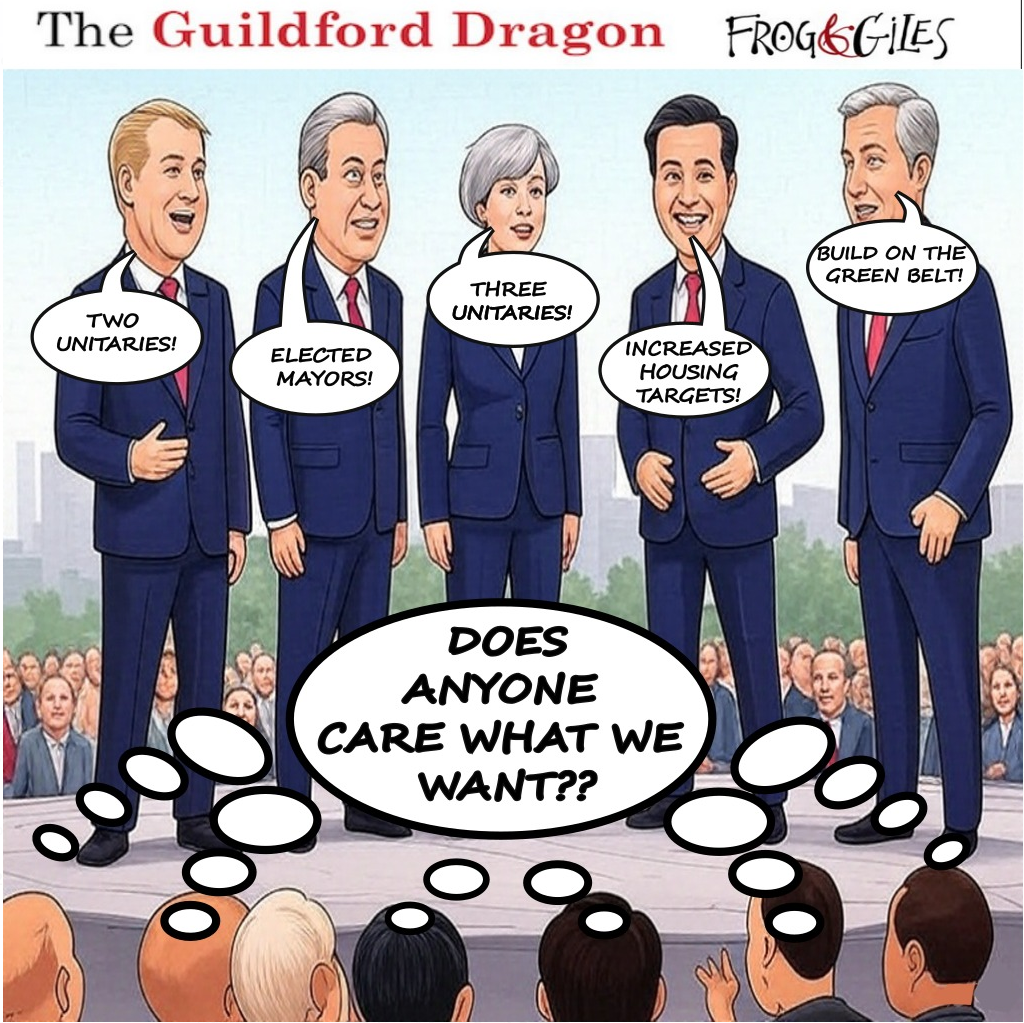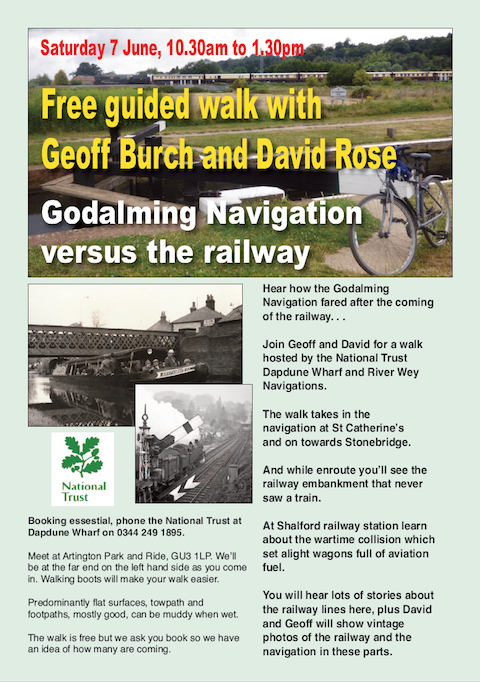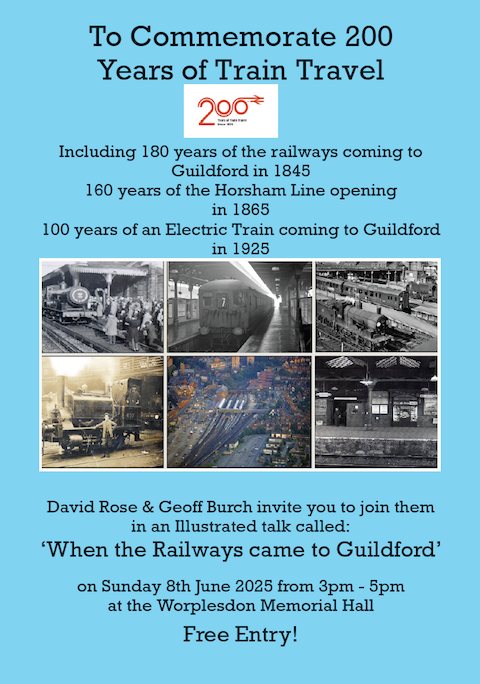 Abraham Lincoln
If given the truth, the people can be depended upon to meet any national crisis...
Abraham Lincoln
If given the truth, the people can be depended upon to meet any national crisis...
 Guildford news...
for Guildford people, brought to you by Guildford reporters - Guildford's own news service
Guildford news...
for Guildford people, brought to you by Guildford reporters - Guildford's own news service
Letter: Slimlining the Planning Committee Will Make It Easier for the Executive
Published on: 11 Mar, 2017
Updated on: 11 Mar, 2017
I can understand why the Executive wants to slimline the existing committee because there have been several recent very important decisions that have not gone their way including Russell Place Farm SANG (Suitable Alternative Natural Greenspace) and Guildford Cathedral.
If the number of protagonists are reduced it should make it easier to get their way.
I do however totally agree that councillors should not be able to read from prepared statements as this does come across as predetermination. I also think that it is a good idea to increase the threshold for a Planning Committee hearing to 20 letters as in this age of social media and online petitions it is so easy for one aggrieved neighbour to raise 10 letters.
Responses to Letter: Slimlining the Planning Committee Will Make It Easier for the Executive
Leave a Comment Cancel reply
Please see our comments policy. All comments are moderated and may take time to appear. Full names, or at least initial and surname, must be given.Recent Articles
- A Lighthouse in the Centre of Town Showing the Way to Community
- Letter: SCC Directs Weedkilling Policy
- Library Gets Lottery Grant To Raise Awareness of Green Issues
- Story of Wartime Canadian Army Entertainment Unit Based at Down Place, Guildford
- Flashback: Around the Very Top: Slow Progress to Our First Remote Stop
- Letter: Weeds Are Just Flowers in the Wrong Place
- Summary of GBC Planning Decisions – May 21, 2025
- Discounted Parking Scheme for Night-time Economy
- Guildford Museum Shares Jekyll’s Boots with British Library for New Exhibition
- Stoke Park Paddling Pool Stays Closed After Tests Show Contamination


Recent Comments
- Kit Collins on Letter: Is This the Ugliest Building in Guildford?
- Barbara Ford on Notice: Have a Blooming Picnic – June 7
- M Durant on Millions of Taxpayer Money Recovered from Railway Fare Dodgers
- Jim Allen on Letter: If GBC Wishes To Be Nature-friendly, Stop Spraying Weedkiller
- John Lomas on Stoke Mill To Be a Pub If Plans Are Approved by Borough Council
- Rebecca Brion on Letter: Is This the Ugliest Building in Guildford?
Search in Site
Media Gallery
Dragon Interview: Local Artist Leaves Her Mark At One of England’s Most Historic Buildings
Dragon Interview: Local Artist Leaves Her Mark At One of England’s Most Historic Buildings
January 21, 2023 / No Comment / Read More
Dragon Interview: Lib Dem Planning Chair: ‘Current Policy Doesn’t Work for Local People’
Dragon Interview: Lib Dem Planning Chair: ‘Current Policy Doesn’t Work for Local People’
January 19, 2023 / No Comment / Read More
A3 Tunnel in Guildford ‘Necessary’ for New Homes, Says Guildford’s MP
A3 Tunnel in Guildford ‘Necessary’ for New Homes, Says Guildford’s MP
January 10, 2023 / No Comment / Read More
‘Madness’ for London Road Scheme to Go Ahead Against ‘Huge Opposition’, Says SCC Leader
‘Madness’ for London Road Scheme to Go Ahead Against ‘Huge Opposition’, Says SCC Leader
January 6, 2023 / No Comment / Read More
Councillor’s Son Starts Campaign for More Consultation on North Street Plan
Councillor’s Son Starts Campaign for More Consultation on North Street Plan
December 30, 2022 / No Comment / Read More
County Council Climbs Down Over London Road Works – Further ‘Engagement’ Period Announced
County Council Climbs Down Over London Road Works – Further ‘Engagement’ Period Announced
December 14, 2022 / No Comment / Read More
Dragon Interview: GBC Reaction to the Government’s Expected Decision to Relax Housing Targets
Dragon Interview: GBC Reaction to the Government’s Expected Decision to Relax Housing Targets
December 7, 2022 / No Comment / Read More
River Wey Breaks Its Banks As Flood Alert Issued
How Can Our Town Centre Businesses Recover? Watch the Shop Front Debate
How Can Our Town Centre Businesses Recover? Watch the Shop Front Debate
May 18, 2020 / No Comment / Read More
Tumbling Bay Weir Repair – Pictorial Report














Jim Allen
March 11, 2017 at 11:19 pm
This is to remove any semblance of discussion or rational thought by reducing input. As for the increase the threshold for a Planning Committee hearing to 20 letters I have never heard such nonsense. It is common practice only to notify adjacent neighbours, normally about five, and stick a tiny notice on a lamp post. It is difficult enough to keep a pretence of rationality in planning matters without making it less democratic.
I say let the whole elected chamber should vote on any planning application – that’s what they were elected to do.
David Potter
March 12, 2017 at 7:01 pm
In response to Mr Allen’s comment above about making planning less democratic. There is a misconception these days that planning decisions should be democratic decisions. Planning decisions should be based on whether the application accords with current policy or not.
With all these consultations and referendums taking place over the last few years it is understandable why people consider otherwise.
Jim Allen
March 12, 2017 at 11:06 pm
A policy is just that a policy – it is not a statute or law thus it can be ignored in a democratic forum until it is challenged in a court of law. And it is as well to remember that when councillors claim otherwise.
Ben Paton
March 13, 2017 at 10:35 am
Mr Allen was, I suspect, using the term ‘democratic’ as a shorthand or colloquial way of saying ‘participatory’.
A borough covers a large physical area. It is not feasible or realistic that a small number of people can be personally acquainted with every locality. Proposals that look good on paper may be completely impractical once local knowledge is taken into account. Access to local knowledge, history and intelligence is essential. Elected councillors can provide a conduit for this information to be taken into account.
Excluding the participation of local councillors may exclude local people from any sense of participation in the planning process. They will feel ever more alienated by a process dominated by big developers spending big money with expensive consultants to present proposals which are often totally self serving and completely untested.
The scale of the money to be made by changing the use of land is so enormous that it is naive to imagine that there is not significant scope for corruption. The smaller the numbers of people involved in the decision, the less the scrutiny – the greater the risk of corruption.
It is of course correct that planning is supposed to be apolitical. But in another sense it is an acutely political process. Our landscape can be changed irreversibly by the testimony of one or two so-called “experts” in the pay of developers – who, with hindsight, may be completely wrong. But by then it is all too late.
Fiona Curtis
March 12, 2017 at 9:30 pm
There is always an element of subjectivity in planning decisions and there are more and more made on this basis as the NPPF has been whittled down to ensure a degree of ambiguity. The combination of greater subjectivity, fewer decision makers and a weaker democracy is not a pretty picture for any borough, let alone one that is about to be subject to a level of growth, few support.
Reducing representation from 23 to 12 or even 15 would mean that far too many wards would be relying on decisions made by a councillor whose primary interests lay elsewhere.
Whilst the percentage split by political party is welcome, I recall the games that were set up at one of the Local Plan workshops where attendees were asked to look at a map of Guildford and move monopoly type houses around the map to the parts they thought could take development. I saw Councillors jokingly moving the developments into each other’s wards and out of their own. All very amusing I guess when it is a game, but how can we be sure this will not happen in reality?